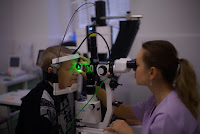PREVENTION VIDEO + ARTICLE:
Researchers find that for those who need it, cataract removal can mean lowering one’s risk of developing dementia by 30%. Learn more.
Undergoing cataract removal was associated with a lower risk of developing dementia among older adults, according to a study carried out in Washington State.
The findings of the study published in JAMA Internal Medicine on Dec. 6, 2021 suggest that the improvement in the quality of life for the affected individual and family is likely considerable, given the substantial association and its lasting effect beyond 10 years.
Sensory function, dementia & aging
Dementia affects nearly 50 million people worldwide. With no cure currently, efforts to reduce the risk or delay dementia onset are increasingly important.
Several studies suggest sensory loss may be a potentially modifiable risk factor for dementia later in life.
The prevalence of hearing (1 out of 3) and vision impairment (1 out of 5) in adults age 70 or older in the United States is high.
Because sensory impairment and dementia are both strongly associated with aging, more knowledge about the association may have important implications for adults as they age, particularly if interventions to improve sensory function reduce dementia risk.
Method
For this prospective, longitudinal cohort study, researchers analyzed data from a subset of participants from the Adult Changes in Thought (ACT) study – an ongoing population-based cohort of randomly selected members of Kaiser Permanente Washington.
Participants were 65 years or older, were dementia-free at the start of the study, and were diagnosed with cataracts before the onset of dementia. Of the 3,038 participants, 59% were women, 41% were men and 91% were self-reported white race.
Data used in the analyses was collected from 1994 through September 2018.
What researchers learned
Researchers found that participants who underwent cataract removal surgery had nearly 30% lower risk of developing dementia compared with participants without surgery, even after controlling for numerous additional demographic and health risks.
In comparison, glaucoma surgery, which doesn’t restore vision, did not have a significant association with dementia risk.
One of the major strengths of this study is that it was based on a large prospective, community-based, observational cohort that allowed for years of follow-up starting before participants developed dementia.
Some of the limitations of this study were that participants were primarily white individuals, and researchers evaluated only the participant’s first cataract surgery and it’s unknown whether subsequent surgery in the other eye impacted dementia risk. Recent enrollment efforts for the ACT study include new strategies to recruit a more diverse population.
More studies needed
If validated in future studies, cataract surgery may have clinical relevance in older adults at risk of developing dementia.
According to the researchers, participants who underwent cataract removal surgery had a lower risk of developing dementia compared with participants without surgery.
Researchers note, however, that additional studies are needed to determine how cataract removal impacts dementia risk.
- The research was supported by NIA grants R01AG060942, P50AG005136, and U01AG006781.
SOURCE:
REFERENCE:
- Lee CS, et al. Association between cataract extraction and development of dementia. JAMA Internal Medicine. 2021; doi:10.1001/jamainternmed.2021.6990











